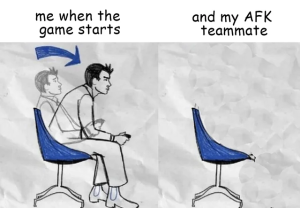Video Games/Time Commitment
Title: Gaming Time Commitment: The Hidden Challenge Behind Multiplayer Games
Time commitment in video games can be a blessing or a curse, depending on what kind of experience you’re after. With single-player games, there’s a beautiful flexibility: you can pause whenever life calls, whether it’s for a snack, a bathroom break, or a quick scroll through social media. Multiplayer games, however, demand a different breed of dedication. You’re part of a squad, a team, or even an entire server – and leaving at a crucial moment isn’t just inconvenient; it’s an act of betrayal. So let’s break down how multiplayer games turn time commitment into a core aspect of gameplay.
The Cost of Commitment in MOBAs: Dota 2
When you’re pressing the "Accept" in a Dota 2 match, you’re committing yourself to at least 30-45 minutes of undivided attention. In Dota, once you’re locked in, you’re in it for the long haul. Matches are fast-paced, intense, and unforgiving to AFKs. Not only does each team need every player fully engaged, but the complexity of Dota’s strategic depth means that one absent teammate can make the difference between victory and defeat. Pausing is nearly unheard of, and your choices affect your entire team. The result? Dota demands you not just to show up but to bring everything you’ve got for nearly an hour.
Apex Legends: The Battle Royale of Variable Duration
Battle royale games add a bit of unpredictability to time commitment. In Apex Legends, you’re committed from the drop to either be the last squad standing or the first to get eliminated. The stakes are high, and the time on the clock is entirely dependent on your skill, strategy, and, yes, a bit of luck. Average matches may last around 15 minutes if you’re playing well, but a bad landing could see you eliminated in seconds. It’s short enough to be replayable and long enough to make every match memorable.
Valorant: Patience and Endurance in the FPS Realm
Valorant, Riot’s take on the tactical shooter genre, takes time commitment to a new level. With matches lasting up to 45 minutes, it’s a test of patience and endurance – especially if you’re struggling with a less-than-stellar team. In Valorant, leaving mid-match is highly discouraged and comes with consequences like temporary bans or rank penalties. Every round matters, so if you’re in it, you’re in it – there’s no safe way out without impacting both your own rank and your teammates’ experience.
Rainbow Six Siege: Strategy and Tension with Every Round
Rainbow Six Siege adds another layer to time commitment, especially when it comes to Ranked matches. Casual rounds might only last 30 minutes, but Ranked matches can stretch up to 45 minutes or more, with every round ramping up in intensity. Leaving a game mid-round leaves your team at a critical disadvantage, and Ranked penalties for abandoning a match can be harsh. Siege demands attention, skill, and strategic thinking for long periods – making time commitment a core part of the game’s intensity and appeal.
Minecraft: Freedom to Commit (Or Not)
And then there’s Minecraft, where time commitment is as flexible as the game itself. Want a quick three-minute session to build a tiny structure or mine some coal? Go for it. Or, feel like spending hours creating an elaborate castle? No problem. Minecraft allows you to leave anytime, without penalizing you or anyone else. The open-world sandbox format gives players complete freedom to come and go, unlike the heavily structured demands of multiplayer MOBAs or tactical shooters. In Minecraft, your world pauses with you, and your experience is yours to control.
Why Time Commitment Matters
Time commitment isn’t just about playing the game – it shapes the entire experience and, by extension, the community and player culture. Games like Dota 2 or Rainbow Six Siege create intense, high-stakes environments that demand undivided attention. In these games, the stakes of leaving aren’t just personal; they’re communal, impacting everyone involved. As a result, these games build communities of players who are willing to give their all, creating strong bonds – or equally strong frustrations – with fellow players.
In contrast, games like Minecraft thrive on a looser time commitment, appealing to those who prefer autonomy and a relaxed experience. The difference? Flexibility means you’re playing for yourself, not for a team, and that changes everything about how you engage with the game and the world around you.
So next time you load up a game, consider the commitment you’re signing up for. Whether it’s a quick 15-minute Apex Legends drop or a dedicated 45-minute Siege Ranked grind, time is as much a resource in gaming as health or mana. Knowing that can mean the difference between frustration and fulfillment – and, hopefully, more victories than defeats.
